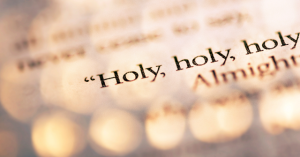
Shownotes
Welcome to Day 1551 of our Wisdom-Trek, and thank you for joining me.
I am Guthrie Chamberlain, Your Guide to Wisdom
Sacred Space – Worldview Wednesday
Welcome to Wisdom-Trek with Gramps! Wisdom is the final frontier in gaining true knowledge. Our mission is to create a legacy of wisdom, seek out discernment and insights, and boldly grow where few have chosen to grow before. Hello, my friend; this is Gramps; thanks for coming along on our journey to increase Wisdom and Create a Living Legacy. Today is Day 1551 of our Trek, and it is Worldview Wednesday. Creating a Biblical Worldview is essential to have a proper perspective on today’s current events. To establish a Biblical Worldview, you must have a proper understanding of God and His Word. This week, we will expand on the past course work as we continue reviewing the book from Dr. Michael S Heiser titled “Supernatural.” The book is an abbreviated version of his more comprehensive book, “The Unseen Realm.” I highly recommend both of these books. Creating a Biblical Worldview based on how the Old and New Testaments connect with God’s overall plan for humanity is essential. This book review will help us understand what the Bible teaches about the unseen world, and why it matters.
Sacred Space
The Israelites spent over a year at Mount Sinai. Why so long? They had already entered into a covenant with God and received the Ten Commandments. But they still had a lot to learn. It was one thing to promise to believe in and be loyal to the God of their ancestors, Abraham, Isaac, and Jacob. It was another to know what God expected and what he was like.
The Concept of Holiness
Many of the Old Testament’s strange laws and practices are grounded in the need to teach people that God is unlike everything else. He is unique in his nature and character; he is entirely other than humanity and anything else. For Israel, that was a truth that had to be reinforced at all times. Otherwise, God might be thought of as ordinary.
The biblical word for the idea of God’s unique otherness is holiness. It means “to be set apart” or “to be distinct.” The concept isn’t necessarily about moral conduct—about the idea that we should behave a certain way to reflect God’s distinct moral standards—though that is included (Leviticus 19:2).
God wasn’t content to simply give Israelites an intellectual explanation of holiness. He wanted the concept of his otherness to permeate life in ancient Israel. The Bible tells us this was accomplished through rituals (symbolic acts) and by rules for approaching sacred areas.

How Is God “Other”?
The short answer to this question is “in every way,” but that’s too abstract. The Bible is much more down-to-earth, and the rituals and rules for Israelite community living reflect that.
For example, the Bible teaches us that God was not only the source of Israel’s life—he was life. God is not of this earth, a place where there is death, disease, and imperfection. His realm is supernatural. Our realm is terrestrial. The earthly space he occupies is made sacred and otherworldly by his presence. The space we occupy is ordinary. God is the polar opposite of ordinary.
In ancient Israel, these ideas were conveyed by the fact that people had to be invited and purified to occupy the same space as God. Many laws in the Old Testament regulate this purifying.
Israelites could be disqualified (made “unclean”) from sacred space by various activities and conditions. Having sex, losing blood, certain physical handicaps, and touching a dead body (human or animal) all rendered an Israelite unclean. Israelites were forbidden from eating certain birds of prey that ate from dead animals (e.g., vultures, hawks; Leviticus 11:13–19) or animals that might be found on or inside a carcass (e.g., lizards, mice; Leviticus 11:24–40).
In these instances, uncleanness was not about morality but rather about association with loss of life and the incompatibility of that with God’s perfection. Even though the logic is simple, it feels foreign to our modern minds. Loss of blood and sexual fluids were perceived as the loss of that which created and sustained life. God was not to be associated with the loss of life but rather with being the giver of life. Requiring “purification” after the loss of such fluids was a reminder of God’s nature. Similar “purification” was required after being made unclean by contact with the dead. One could also be excluded from sacred areas in Israel due to physical imperfection or injury, in this case, because such imperfection is incompatible with God’s perfection. All these laws were intended to drive home a supernatural worldview.
Fixing the Problem of Uncleanness
Being “unclean” and unfit to approach sacred space was a serious matter for ancient Israelites. They could not bring sacrifices and offerings to the required locations if they were unclean. The solution was ritual purification, sometimes involving its own sacrifice or a waiting period.
The logic of blood sacrifice—the dabbing or sprinkling of blood on a person or object to render them clean and fit to occupy sacred space—is foreign to us. But blood sacrifices had a theological purpose—they introduced the concept of substitution. Since blood was the life force (Leviticus 17:11), the taking of an animal life taught the lesson that approaching God on any terms except his own meant death. The blood of the sacrifice was a merciful substitute to rectify an Israelite’s defiled, unclean state.
The teaching point was that God was preserving an Israelite’s life by substituting the sacrifice. Human life was more sacred than animal life because humans were created in God’s image (Genesis 1:26; 9:6). Israelites owed their existence by a supernatural intervention that enabled Abraham and Sarah to have a child (Genesis 12:1–3). But human life was in peril in the presence of a holy God. Sacrifices reminded them that God had power over life and death—and God wanted to show them mercy.
Heaven (and Hell) on Earth
Drawing attention to God’s otherness communicated specific ideas—not only about God, but also about supernatural boundaries. The idea of “realm distinction” was fundamental to the supernatural worldview of Israel. If where God’s presence dwelt was holy, the ground elsewhere was not—it was either ordinary or, in some cases, hostile and evil.
Reminders of Eden marked God’s own presence. Many features of the tabernacle and the temple were designed to make people think of Eden, the place where heaven and earth met. The golden lampstand was fashioned and decorated as a tree (Exodus 25:31–40), an analogy to Eden’s Tree of Life. It stood guard in front of the veil that blocked the way to the Holy of Holies, the place where the ark of the covenant was stationed, the lid designed to function as a throne for God (Exodus 25:10–22).
The cherubim inside the Holy of Holies are also a clear connection to Eden. The Edenic cherubim stood guard at the dwelling place of God in Eden (Genesis 3:24). The cherubim inside the Holy of Holies guarded the lid to the ark of the covenant (Exodus 25:18–20). Later, after Solomon built the temple, the tabernacle’s tent structure was moved inside the temple, and two giant cherubim were installed over the ark as a throne for God, making the ark his footstool (1 Chronicles 28:2).
The temple was also decorated like Eden’s garden, filled with images of lush vegetation and animals (1 Kings 6–7). Flowers, palm trees, lions, and pomegranates were carved into its architecture. It was a visual reminder of the place where God had first come to earth to live with his human family.
Israelites needed to be reminded of the dark side of cosmic geography too. If the Israelite camp, and later the nation of Israel, was holy ground, the home of God and his people, then the terrain outside Israel was unholy ground. God had, long before Sinai, forsaken the other nations and given them over to lesser gods (Deuteronomy 4:19–20; 32:8–9). He would one day reclaim the nations, but during biblical days, they were realms of darkness.
One Israelite ritual brought this lesson home in unforgettable detail. The Day of Atonement (Yom Kippur), held every year and described in Leviticus 16, included a fascinating object lesson to remind people about holy and unholy ground.
Two goats were involved. One was sacrificed, and its blood sprinkled in the sanctuary to cleanse it of human defilement for another year. The sacrificed goat was “for the Lord.” The other goat wasn’t killed—it was sent out into the wilderness after the high priest symbolically transferred the people’s sins onto it. That goat was “for Azazel.”
Who or what is “Azazel”? Some translations render the word scapegoat instead of Azazel. In the Dead Sea Scrolls, the Hebrew word in question is a proper name—the name of a demon. During the wilderness journey to the Promised Land, the Israelites sacrificed to demons (Leviticus 17:7), because they feared evil forces would threaten their camp. After all, the wilderness was outside the Israelite camp, and therefore it was the place of evil entities. This practice had to stop, and the goat for Azazel accomplished that. The goat for Azazel wasn’t an offering to evil gods—the goat was never sacrificed. Instead, sending it into the wilderness was a symbolic way of cleansing holy ground (the Israelite camp) from sin.
Why This Matters

Things changed in the New Testament, but also stayed the same. God is still other. His holiness requires that we be purified to enter his presence. For us, that’s accomplished by believing in what Jesus did on the cross.
Everything Jesus did on our behalf had supernatural overtones. He went out into the wilderness—the place we would expect to find the forces of evil—and overcame Satan’s temptation. That event was followed by the beginning of his ministry, which culminated in overcoming the Devil, who “has the power of death” (Hebrews 2:14). Jesus was crucified outside the holy city (Hebrews 13:12). He was unclean because our sins were upon him, and Jerusalem was holy ground.
Jesus’ death and resurrection sanctify us—make us fit for God’s presence. Our sins were “taken away” (Romans 11:27; see also 1 John 3:5). Though unclean sinners, we are holy if we are in Christ. Though imperfect, our imperfections are overlooked because of Jesus. It’s that simple, yet that profound.
We tend to think Israelites were in many ways more spiritually privileged than we are. After all, they had God’s presence right in their midst. They lived in a world where supernatural, cosmic geography was real. We tend to think we would be more spiritual, more tuned-in to God, if only we had what they had, if only those continual reminders of God were our reality. Here is a not too subtle secret, the New Testament says they are.
We don’t need a tabernacle or temple to mark sacred space. Our bodies are sacred space. Paul calls our earthly bodies a “tent” (2 Corinthians 5:4) because we are indwelt by the same divine presence that filled the Holy of Holies in the tabernacle and the temple (Romans 8:9–11). Eventually, our body, the earthly home of our spirit, will die, only to be replaced by a “house not made with hands” (2 Corinthians 5:1–3), a heavenly dwelling—the new Eden, heaven returned to earth (Revelation 22:1–3).
Since God indwells believers today through his Spirit, each church—each gathering of believers—is holy ground. This is why Paul, when sadly telling the Corinthians to expel an unrepentant Christian who was living in sin, instructed them to “deliver this man to Satan” (1 Corinthians 5:5). The church was holy ground. Outside the fellowship of believers was the domain of Satan. That was where sin and its self-destruction belonged.
It’s time we looked at ourselves through supernatural eyes. You are a child of God, fit for sacred space, not because of what you do or don’t do, but because you are in Christ, adopted by God (Romans 8:15; Gal. 4:5). You’ve been extracted from the realm of darkness and “transferred … to the kingdom of His beloved Son” (Colossians 1:13). We must never, not for a moment, forget who we are in Christ—and what that means to the world.[1]
That will finish our study for this week’s worldview Wednesday. Join us again next week as we continue building our Biblical Worldview. Tomorrow we will ponder another bit of wisdom from Gramps. So encourage your friends and family to join us and then come along with us tomorrow for another day of ‘Wisdom-Trek, Creating a Legacy.’

If you would like to listen to any of our past 1550 treks or read the Wisdom Journal, they are available at Wisdom-Trek.com. I encourage you to subscribe to Wisdom-Trek on your favorite podcast player so that each day’s trek will be downloaded automatically.
Thank you so much for allowing me to be your guide, mentor, and, most of all, your friend as I serve you through this Wisdom-Trek podcast and journal.
As we take this Trek together, let us always:
- Live Abundantly (Fully)
- Love Unconditionally
- Listen Intentionally
- Learn Continuously
- Lend to others Generously
- Lead with Integrity
- Leave a Living Legacy Each Day
I am Guthrie Chamberlain….reminding you to ’Keep Moving Forward,’ ‘Enjoy your Journey,’ and ‘Create a Great Day…Everyday’! See you Tomorrow!
[1] Heiser, M. S. (2015). Supernatural: What the Bible Teaches about the Unseen World—And Why It Matters. (D. Lambert, Ed.) (pp. 77–85). Bellingham, WA: Lexham Press.